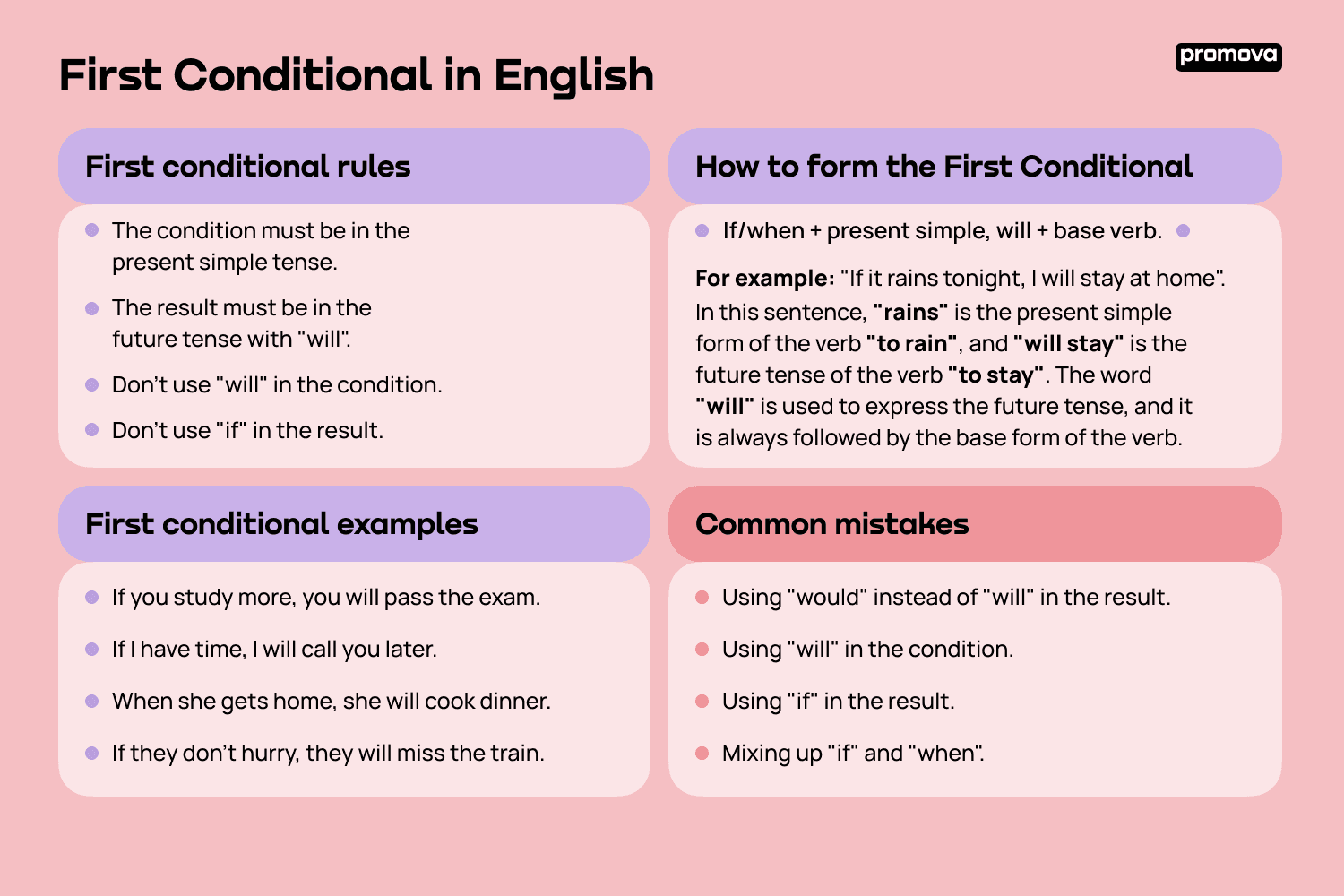First Conditional in English
Contents
If you're learning English, you might have come across the term "conditionals". These are sentences that express a hypothetical situation and its possible outcome. In this reference, we'll focus on the first conditional and understand how to form it, as well as find lots of great sentence examples to help practice. Let's get started!
What does the first Conditional mean?
The first conditional helps us talk about a future situation that is likely to happen, and its probable outcome if a certain condition is met. It expresses a cause-and-effect relationship between the condition and the result. The condition is usually introduced by the word "if" or "when", and the result is in the future tense.
For example: "If it rains on Sunday, I will stay at home". This sentence means that the speaker will stay at home if it rains tomorrow. If it doesn't rain, the speaker won't stay at home.
First conditional examples
More examples of first conditional sentences:
- If you study more, you will pass the exam.
- If I have time, I will call you later.
- When she gets home, she will cook dinner.
- If they don't hurry, they will miss the train.
These sentences express a possible future outcome based on a certain condition. They are used to make predictions or to talk about plans and intentions.
How to use 'if' and 'when' in the first conditional
Both "if" and "when" can be used to introduce the condition in a first conditional sentence, but they have slightly different meanings.
"If" is used when the condition is uncertain or hypothetical. It suggests that the condition might or might not happen.
For example: "If I win the lottery, I will buy a new car". This sentence means that the speaker might or might not win the lottery, but if they do, they will buy a new car.
"When" is used when the condition is certain or expected. It suggests that the condition will happen at some point in the future.
For example: "When I finish my work, I will go for a walk". This sentence means that the speaker will finish their work at some point, and then they will go for a walk.
How to form the First Conditional
The first conditional follows a simple structure:
If/when + present simple, will + base verb.
For example: "If it rains tonight, I will stay at home".
In this sentence, "rains" is the present simple form of the verb "to rain", and "will stay" is the future tense of the verb "to stay". The word "will" is used to express the future tense, and it is always followed by the base form of the verb.
Difference Between First Conditional and Other Types of Conditionals
The first conditional is different from other types of conditionals in terms of the likelihood of the condition and the result. While the first conditional talks about a future situation that is likely to happen, the second and third conditionals talk about hypothetical or imaginary situations.
The zero conditional helps us talk about facts. It helps make scientific statements, relay simple truths, and so on. For example, "If you heat up water, it boils" This sentences conveys a scientific fact.
The second conditional is used to talk about a hypothetical situation in the present or future and its possible outcome. It expresses an unlikely or impossible condition.
For example: "If I had a million dollars, I would travel around the world." This sentence means that the speaker doesn't have a million dollars, and it is unlikely that they will have it in the future. Therefore, the condition is hypothetical.
The third conditional helps us talk about a hypothetical situation in the past and its possible outcome. It expresses a regret or a missed opportunity.
For example: "If I had studied more this month, I would have passed the exam". This sentence means that the speaker didn't study hard enough, and as a result, they didn't pass the exam. The condition is hypothetical because it refers to a past situation that cannot be changed.
7
First conditional rules
There are some rules to keep in mind when using the first conditional:
- The condition must be in the present simple tense.
- The result must be in the future tense with "will".
- Don't use "will" in the condition.
- Don't use "if" in the result.
For example: "If it rains tonight, I will stay at home". This sentence follows the first conditional rules because "rains" is in the present simple tense, and "will stay" is in the future tense with "will".
Common mistakes
Common mistakes to avoid when using the first conditional:
- Using "would" instead of "will" in the result.
- Using "will" in the condition.
- Using "if" in the result.
- Mixing up "if" and "when".
For example: "If it rains tomorrow, I would stay at home". This sentence is incorrect because "would" is used instead of "will" in the result.

Summary
The 1 conditional is a useful tool for expressing a probable outcome based on a certain condition. It is a simple structure that follows specific rules to avoid confusion. By mastering the first conditional, you can make predictions, express intentions, and talk about plans with confidence.
Good luck on your learning journey and make sure to check out more handy references below!
Comments